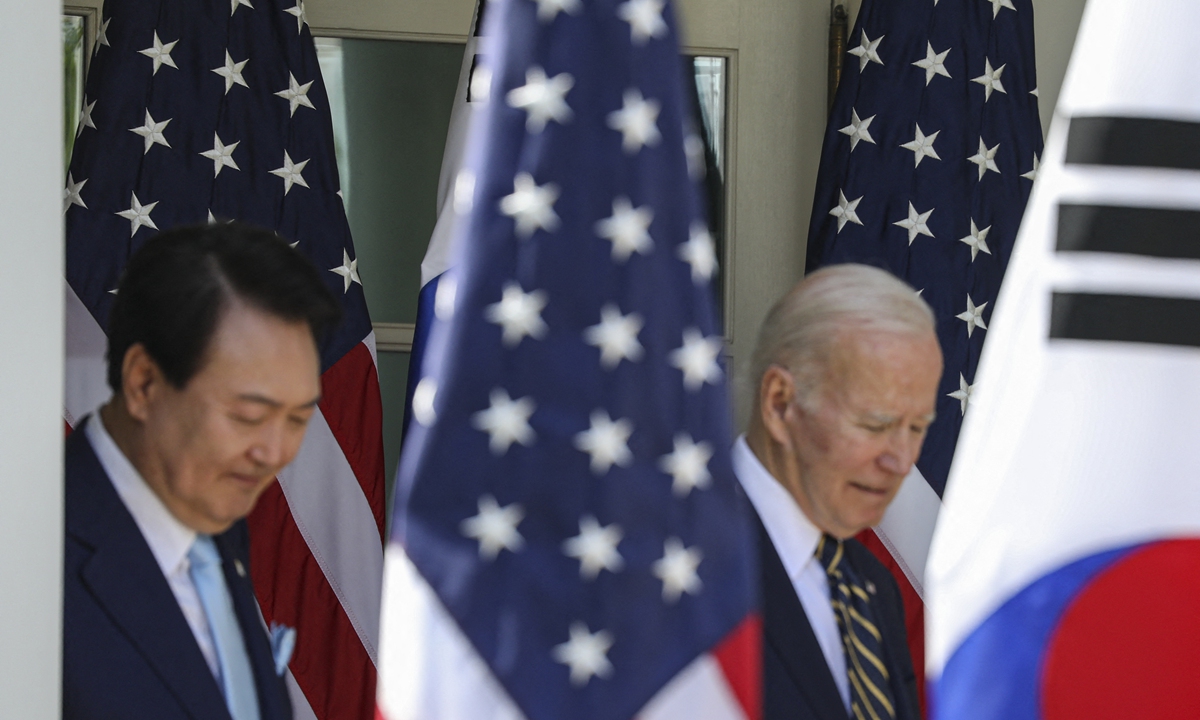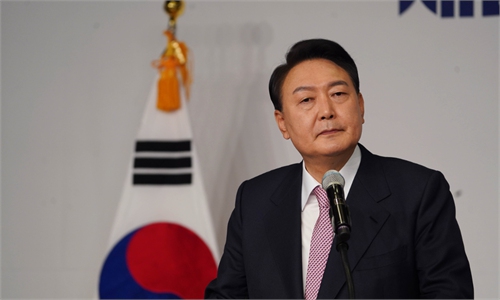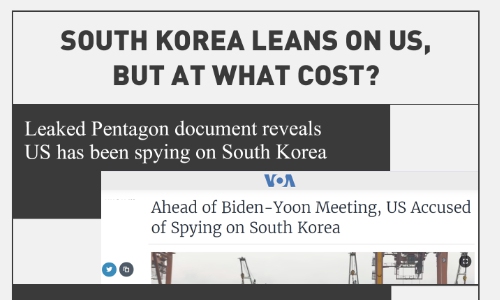
US President Joe Biden and South Korean President Yoon Suk-yeol hold a joint press conference at the White House in Washington D.C., US on April 26, 2023. Photo: IC
It seems that South Korean President Yoon Suk-yeol views or identifies Washington Declaration as the biggest achievement of his visit to the US. He described it, with passionate language, as an "unprecedented" commitment by the US. The Washington Declaration, issued after Yoon's talk with US President Joe Biden, has two main contents: the establishment of a new Nuclear Consultative Group (NCG) and the upcoming visit of a US nuclear ballistic missile submarine to South Korea, for the first time in more than 40 years. It is said to strengthen "extended deterrence" against North Korea.
In other words, Yoon wants to bring back a "nuclear umbrella" from the US. However, compared with the various gifts he brought to the US and the cost to South Korea's interests in this visit, this "nuclear umbrella" appears to be unrealistic and will only bring new risks. It is not only not an achievement report to the domestic public in South Korea, but is highly likely to ignite a new round of tension on the Korean Peninsula. Its hidden side - targeting China - is also a potential hazard for South Korea. In the face of Yoon's return from the US, clear-minded South Koreans will be concerned and cannot possibly be delighted.
Some US media have described the declaration as "a fig leaf" (used for concealing embarrassment) for the US to dissuade South Korea from going nuclear, but its negative impact on South Korea is obviously more than that. It is full of irony to call it a "diplomatic achievement" or "the victory of Yoon's government." Rather than saying that it has received an unprecedented commitment to nuclear protection, it's clear it has lost its autonomy unprecedentedly.
The real "winner" is Washington. It has almost no cost, and only with a declaration that is of little practical use, it exchanged the "substance" of the US with South Korea's "face." The Yoon administration wanted "nuclear sharing," but the US did not loosen its stance, and South Korea had no say in the nuclear decision-making. To elevate the irregular nuclear dialogue mechanism to a regular one and to send Ohio-class nuclear submarines deployed in Guam to South Korea on a regular basis, it is more of a psychological comfort to South Korea, but for Northeast Asia, it is like inviting a wolf into the house.
The root cause of the long-standing nuclear issue on the peninsula lies with the US. If South Korea really wants a sense of security, it needs to urge the US to adopt a more responsible attitude toward formulating its policy toward North Korea and to work with all parties to promote the denuclearization process on the peninsula.
Bringing US nuclear power into the peninsula will inevitably create strong stimuli in North Korea and further exacerbate the security dilemma on the Korean Peninsula. The security of the peninsula is indivisible, and joint security is the inevitable choice for achieving lasting peace. South Korea is really on the wrong path. In this regard, the lessons learned from the conflict between Russia and Ukraine are profound.
Yoon's visit to the US is already more than halfway through, and it is obvious that South Korea did not get the autonomy it expected. Instead, the US has gained even deeper control over the country. It is more clearly reflected in the Leaders' Joint Statement in Commemoration of the 70th Anniversary of the Alliance between the United States of America and the Republic of Korea issued on the same day as the Washington Declaration. The statement's position on regional and major international issues is completely in line with Washington's tone in terms of both content and language. Although it is called a joint statement, South Korea is merely a signatory. The joint statement ambiguously talks of the so-called "economic coercion" and once again mentioned "peace and stability in the Taiwan Straits." Being a signatory to such a joint statement is bound to harm mutual trust with China.
At the joint press conference after the meeting between Joe Biden and Yoon, the US side talked almost exclusively about how these "achievements" would promote US interests, and the journalists were more concerned about domestic US affairs. Some netizens described the interests of South Korea as equivalent to air at this press conference. This undoubtedly made Yoon's mention of a "true global alliance" at the press conference even more awkward.
Recently, there have been media reports that the White House "requested" Seoul to put pressure on South Korean chip manufacturers not to increase chip sales to China when China investigates US company Micron Technology, to prevent Korean companies from taking advantage of the market gap left by US companies. This is a true reflection of the US-South Korea relationship. Previously, South Korea had been talking about the "diplomatic relations with four major powers," but now it has become completely one-sided toward the US, and it is inevitable for it to lose balance and even lose itself.
The American Newsweek published an article during Yoon's visit to the US, suggesting that "it's time for an East Asian NATO," advocating for a so-called "economic NATO" based on democratic values with the US, Japan, South Korea and China's Taiwan region, which is a malicious and sly proposal made by someone who sees that the US "controls" South Korea. South Korea's strengthening dependence on the US is the vulnerability that the US has seized. Some have said that of all the governments in South Korea's history, the Yoon administration may be the least independent-minded toward the US, and this visit to the US undoubtedly confirms this evaluation.


